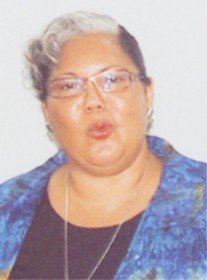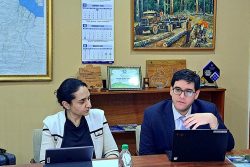Issues and challenges in the new academic year
In this issue the Guyana Review publishes a collection of articles that address themes and issues in the development of the education system. Some of the published articles were contributed by the Ministry of Education
A senior Caribbean Examinations Council (CXC) official has confirmed that long-expressed concerns over the decline in the ‘reading habit’ among Caribbean students is well-founded and that restoring the reading habit depends to a large extent on the support of teachers and parents.

CXC’s Assistant Registrar (Syllabus Development) Cheryl Stevens told Guyana Review during a recent interview that feedback available to the regional examinations body from across the region suggests that reading has become less popular among children in the region,. While Steven says that the CXC has been seeking to encourage reading by providing teachers with suggested reading lists for secondary school students which is appended to the English syllabus she believes that in the final analysis much of the responsibility for cultivating an aptitude for reading lies with those who are closest to the children. “The CXC as an examination Board can only go so far. We can assist by making suggestions but at the end of the day it really depends on what teachers and parents do as far as exposure and encouragement are concerned. I think, however, that the CXC has sought to be supportive by ensuring that teachers in the region are aware of what reading material is available and suitable for the various levels. Our suggestions with regard to what is available cover novels, plays and poetry.”
In Guyana, the Ministry of Education has long conceded that reading has become a diminishing pursuit among school-aged children and the various reading programmes that have been implemented in some schools across the country do not appear to have remedied the problem. Efforts to create and sustain libraries in schools have been hampered by a chronic shortage of trained librarians while some teachers say that too many parents appear inclined not to insist on library use and at the same time to encourage the unregulated viewing of television in homes.

Stevens who is based in the CXC’s Western Zone Office in Jamaica was in Guyana recently to conduct workshops with secondary school teachers as a component of a region-wide re-issuing of syllabuses for the next two cycles of the CXC examinations. The workshops are designed to familiarize teachers with text book and other changes and is being conducted in each of the Caribbean Community territories.
Stevens’ assignment in Guyana was concerned specifically with changes to the CSEC English examination. “What we have done is to make adjustments to the rationale and aims of the syllabus in order to bring it in line with current developments in the region. Additionally, we are aligning our syllabuses with one of the mandates of Caricom Heads of Government, that is, to ensure that our syllabuses produce ideal Caribbean students. We have revisited some of the teaching and learning activities and we have made some clarifications to the English A assessment component. We have also had to select new text books for the English Literature component for the next two cycles, 2012 to 2014 and 2014 to 2017” Stevens told The Guyana Review.
The CXC has also made adjustments to the assessment component of the English B examination. Stevens says that text book selection retains the tradition of separate genres of literature, that is, a mixture of West Indian literature and literature from outside the region. She says that the focus of the CSEC English Literature examination continues to be “to provide the foundation for further education in literature in order to allow students to have the opportunity of moving to that next level if they so desire.”
The Caribbean Examinations Council is currently celebrating its 30th anniversary and Stevens says that she believes that over the years the Council has sought to develop syllabuses that seek to respond to the needs of the region and to ensure at that same time that Caribbean students can hold their own in the wider intellectual community. “What is also significant about the CXC is that it provides our teachers with a significant role in terms of their responsibility for the Schools Based Assessment. (SBA’s) “When we are using the external examination our teachers did not have that opportunity to inform the assessment component. We have attempted to create a system that ensures that all of our syllabuses have that internal school-based assessment component that allows our teachers to play a role in the assessment of their students. I also think that the Council continues to do a great deal to keep teachers abreast of changes in the syllabuses, We have also done a lot of teacher training activities within the Ministries of Education across the region in order to support the professional development of the teachers.”
Stephens told The Guyana Review that the CXC had also done considerable work in the development of materials and have also provided learning opportunities for persons who are outside the traditional education system. “By having available alternative papers for the School-Based Assessment we have provided opportunity for persons who are not in traditional system and who want to upgrade themselves to avail themselves of the opportunity.”
Stephens told Stabroek Business that she thought that no less than the General Certificate of Education examination 30 year-old regional examination continued to respond to the intellectual needs of students both in a Caribbean context as well as in the context of the broader international community. “Our children continue to secure scholarships and to compete effectively in both British and American universities. We are satisfied that our certification is well-recognised internationally and that says to me that the value of that certification is evidenced in the product that comes out of the system. While we are sure that our regional examinations equip our students to meet the needs of the region we are also certain that they also prepare them to meet international needs as well.”









